Note: This piece, originally written for The Vincentian, was first published by that newspaper on September 4th, 2009. The interviews were conducted over a two-week period in August.
PARLIAMENT THIS WEEK debated and passed the Constitution Reform Bill 2009, ending six years of consultation and signalling the commencement of what could be a divisive campaign for and against the proposed Constitution.
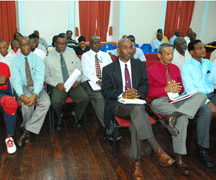
Six years ago, in an unprecedented move, the Leader of the Opposition here seconded in Parliament a motion moved by the prime minister.
The ruling Unity Labour Party (ULP) and the opposition New Democratic Party (NDP) gave their blessings to the Constitutional Reform Commission (CRC).
The body, now the Constitutional Reform Committee (CRC), comprised commissioners drawn from a wide cross-section of Vincentian society.
It was charged with re-examining the document that the colonial masters gave the country when it gained political independence in 1979. (Read the 1979 Constitution)
Prime Minister Dr. Ralph Gonsalves had identified no fewer than 14 weaknesses in the 1979 Constitution, saying that there were “creative” and “innovative” solutions available.
The CRC saw as its “seminal challenge” the deepening of democracy and the reduction of prime ministerial power.
It consulted with Vincentians across this multi-island nation and citizens overseas before presenting its first draft to parliament earlier this year.
With about three months to go before Vincentians vote in a referendum on the proposed new Constitution, the Opposition has withdrawn its support and calls for a “No” vote.
The country is divided along partisan political lines, and that divide is expected to widen as the two main political parties move into campaign mode, trying to convince Vincentians on how they should vote.
The People’s Movement for Change (PMC), a socio-political organisation, last week called for the referendum to be postponed until one year after the next general elections, due by December next year.
“…[T]he years of effort and scarce financial resources expended so far can be saved if the referendum is depoliticized…, held at a time when both major parties will have the opportunity to think in the national interest rather than from a partisan vantage point,” the PMC says in a statement.
“The Constitution should not be looked at a time close to a general election… Too many partisan political matters will get in the way,” Leader of the Opposition and NDP president Arnhim Eustace tells THE VINCENTIAN.
“Both parties are looking at it with [elections] in the back of minds, at this stage,” he says, even as he announces that the NDP “will campaign against it fully like if we are running an election campaign”.
Dr. Gonsalves promises the same, saying that state money will fund “a spirited campaign for a “Yes” vote as you would see for any election”.
Alive constitutionalism?
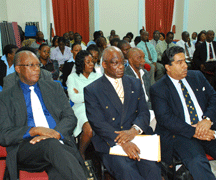
CRC chairman Parnel Campbell, Q.C. summarises the main proposals of the new Constitution in a document published recently in the local press.
“One of the most dramatic features of the proposed new Constitution is the extent to which it reduces the constitutional powers of the Prime Minister, whilst increasing the constitutional powers of the Leader of the Opposition…,” the former attorney general says.
Opposition leader Arnhim Eustace disagrees, saying that this is one of the main reasons why his NDP is calling on Vincentians to vote “No” in the referendum.
“I see no fundamental provision that markedly reduces prime ministerial power,” he tells THE VINCENTIAN.
To him, the CRC has failed in meeting its “seminal challenge” of realising an alive constitutionalism that rests on the twin pillars of deepening democracy and reducing prime ministerial power.
“I am deeply disappointed in what has been presented to Parliament,” he says of the proposed document, which was passed in Parliament on Tuesday.
Top 3 ‘Yes’ reasons
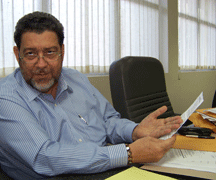
THE VINCENTIAN asked both leaders to identify their top three reasons why citizens should vote for or against the proposed Constitution.
“The first reason is that this proposed Constitution deepens participatory democracy, extends the range of our rights and freedom and enhances their protection, and it provides for greater accountability of the elected members to the people who have elected them,” Dr. Gonsalves says.
He added: “This is a nationalist, home-grown Constitution, which brings our Constitution to our people. It is an exercise in historical recognition. The manifestation of this includes a home-grown president and the process for ending final appeals to the Privy Council and substitution by the Caribbean Court of Justice.
“Finally this Constitution makes it far easier for greater facilitation in deepening the regional integration process. …As a bundle, better government all around: for individuals and the state administration, the country as a whole.”
Why vote ‘No’
“There is no proposal there now that I see reduces the powers of the prime minister… As the Prime Minister said, we can describe the present system as one not of parliamentary government, not of cabinet government, but essentially of prime ministerial government,” Eustace says.
He tells THE VINCENTIAN that reducing the powers of the prime minister was fundamental to the NDP’s support of the constitutional exercise.
He further says that inequities in the system have not been corrected, noting the 1998 elections when the ULP won ten percent more of the popular votes but was in opposition because the NDP won one more seat in parliament.
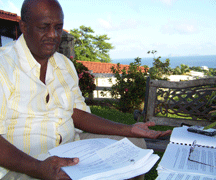
“A full ten percent of our voting population said, ‘Listen that is the party we wanted.’ It is just the vagaries of the first-past-the-post system … which prevented the ULP from forming government,” Eustace says as he describes the system as “not fair”.
“What we are trying to do is correct inequities in the system. That is the objective behind it. You don’t want a situation where a fellow gets 55 percent and still lose,” he tells THE VINCENTIAN.
Eustace tables a scenario under the mixed electoral system the new Constitution proposes.
The new system combines first-past-the-post and proportional representation.
In his example, both parties each wins about 50 percent of the popular votes, with one party winning one seat more and the other one vote more.
Eustace believes that the party with one seat more should form the government. However, under the proposed Constitution, the party with the one-vote majority will be given two additional seats and thereby form government.
“Let them change that! We are not accepting that under any circumstance!” he says. “We won under that old system. We are the ones who want to change it.”
He proposes a one-seat increase per three percent vote.
Eustace says that there were several other areas of concern to the NDP and he mentions the need to have the Constitution state that the price paid for land acquired by the state should not be less than the market value of that at the time of the acquisition.
Election gauge?
While the political parties swipe at each other, CRC chairman Campbell has called on Vincentians to “listen carefully to one another’s opinions” with a view to understanding why they hold those views.
Dr. Gonsalves says that the NDP, realising that his administration will get the credit for the new Constitution, has withdrawn its support.
He says that the Opposition “…thought that the process [would] falter” and is now complaining about “really limited issues”.
He says that if the government wins the referendum and opposition opposes it, there is a likelihood that “people would be reminded of this and [the NDP] will be punished in the elections”.
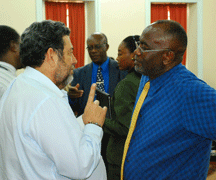
Dr. Gonsalves believes that the NDP would also be “punished” if the referendum fails.
“People are going to say in the election to come, ‘The guys are backward. They prevented 62 percent of the people from getting a new Constitution. We must punish them.’
“So on either way, punish them electorally if they continue on the path on which they are.”
But Eustace says that Gonsalves is using the referendum to gauge his party’s chances at the next poll, when the ULP will bid for a third consecutive term.
“My view is that the Prime Minister is hoping that he gets 55 percent [of the votes], which will give him a clue as to whether he should go with the election sooner or later.”
“We have to get something that really convinces people, ” he adds, noting that it is difficult to get two-thirds of the votes cast in any election in this country, with not even the NDP doing so when it won all the seats in 1989.
He says he would have called on his supporters to vote “Yes”, “if it was a situation where everybody was genuine in their program and it wasn’t close to an election”.
“But in this adversarial kind of relationship — that is why it should not be done near to elections….
“I have made that point over and over, saying, ‘You are pushing this thing too close to the end of a political term. A lot of other matters are going to get mixed up in that because the public is treating it like elections,’” he said, noting that changes can’t be made to the bill after last Tuesday.
But while the political tribes ready their battle gear, Campbell, who describes the constitutional reform exercise as renovating a family house, says:
“It is important that all concerned in the exercise should be willing to arrive at reasonable compromises so that the final renovations would meet with the widest possible approval.”





![[In-Depth] Battle Cry! - Political parties prepare for referendum campaign 1 Advertisement 21](https://cdn.iwnsvg.com/uploads/2013/06/Bowmans-Pharmacy.gif)